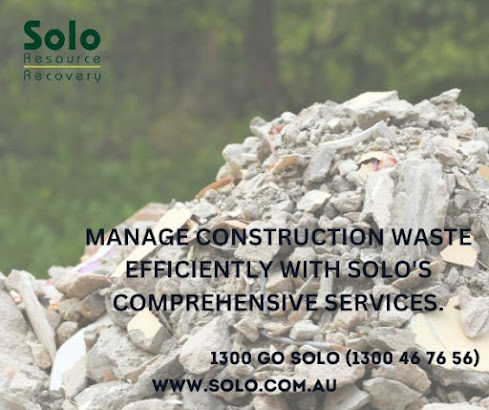Construction Waste Disposal and Responsible Construction Waste Management
Australia's construction industry is a key driver of economic growth, and it is also a substantial contributor to the nation's waste footprint, with construction and demolition activities accounting for around 38% of the total waste generated in the country. As such, the proper disposal of construction waste has become a critical issue for environmental sustainability and community well-being, and this article looks at the challenges associated with construction waste, underscoring the significance of responsible construction waste management, and explores sustainable practices within the Australian context.
The construction industry in Australia
is of great economic and social importance, fuelling development and providing
essential infrastructure. However, this sector simultaneously generates a vast
amount of waste, comprising of materials such as concrete, wood, metal,
plastics, and more, and statistics indicate that the construction and
demolition sector produces approximately 29 million tonnes of waste annually,
underscoring the need for robust waste management strategies.
Construction Waste Collection
Efficient construction
waste collection is a cornerstone in the broader framework of responsible waste
management. Construction sites are veritable hubs of material diversity, and the
effective segregation of waste at the source is essential for facilitating
recycling and reducing environmental impact. And Australian construction sites
must adhere to stringent regulations and guidelines for waste separation, which
fosters a systematic approach to construction waste collection.
In response to this challenge, the
Australian construction industry is increasingly embracing innovative practices
to enhance waste collection efficiency, such as implementing on-site waste
sorting stations, where workers categorise and separate materials. This method
not only streamlines the waste collection process but also ensures that
recyclable materials are identified and redirected to appropriate channels.
Construction Waste Disposal
Given its diverse composition and
substantial volume, the disposal of construction waste presents a formidable
challenge. Traditional disposal methods like landfill are no longer sustainable
in the face of escalating waste quantities and the imperative to mitigate
environmental impact. Therefore, responsible construction
waste disposal involves adopting alternative strategies that prioritise
the principles of reduce, reuse, and recycle.
Sustainable Practices
Material Reuse and Recycling
One important element of sustainable
construction waste management is the promotion of material reuse and recycling.
Salvaging and reusing materials on-site or redirecting them to other projects
not only diminishes the demand for new resources, but also significantly
diminishes the overall environmental impact. In Australia, initiatives
encouraging the recycling of construction waste materials have gained momentum,
with the recycling rate steadily rising in recent years.
Advanced Sorting Technologies
The integration of advanced sorting
technologies in construction waste facilities is a progressive step towards
efficient waste separation. Cutting-edge equipment can accurately identify and
sort various materials, streamlining the process of diverting recyclables from
non-recyclables, and incorporating such technologies into construction waste
disposal processes contributes to a more sustainable and systematic approach.
Community Engagement
Engaging local communities is
instrumental in fostering responsible construction waste management. Raising
awareness about the importance of proper waste disposal and involving
communities in recycling initiatives fosters a sense of shared responsibility,
and community-led programs in Australia have demonstrated promising results in
reducing construction waste and promoting sustainable practices.
Australian Construction Waste
Statistics
The scale of the construction waste
challenge in Australia is underscored by government statistics. During 2020 -
2021, the construction and demolition sector produced approximately 29 million
tonnes of waste, with less than half of that being recycled. This reveals a
considerable opportunity for improvement in waste management practices across
the industry. Recognising this, governments at both state and federal levels
have introduced initiatives to incentivise construction companies adopting
sustainable practices.
Government Initiatives
Governments in Australia are aware of
the environmental impact of construction waste, prompting the introduction of
initiatives aimed at promoting responsible waste management. These include
grants and incentives for construction companies adopting sustainable practices,
and regulations mandating the implementation of waste reduction plans on
construction sites. Compliance with these regulations is essential for
obtaining project approvals and ensures a more environmentally conscious
approach to construction waste disposal.
The responsible management of
construction waste is essential for the sustainability of Australia's
construction industry, and the challenges posed by the sheer volume and
diversity of construction waste necessitate innovative and sustainable
solutions. By prioritising efficient construction waste collection, embracing
responsible disposal methods, and adopting sustainable practices, the industry
can significantly reduce its environmental footprint and contribute to a more
circular economy.
As Australia's construction sector
continues to evolve, the emphasis on responsible construction waste disposal
practices will play a pivotal role in shaping a more environmentally conscious
and socially responsible industry. Government support, community engagement,
and the integration of advanced technologies are pivotal components in
achieving a more sustainable future for construction waste management in
Australia, and as the industry navigates these challenges, a concerted effort
towards responsible waste management will be crucial in ensuring a harmonious
balance between economic development and environmental stewardship.
Do you need assistance with your
construction waste? If so, give Solo a call on 1300 GO SOLO (1300 46 76 56), or
drop us a line here.


Comments
Post a Comment